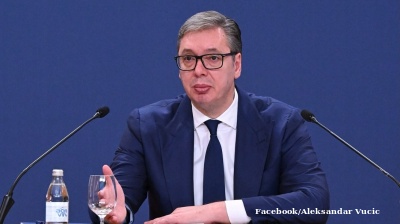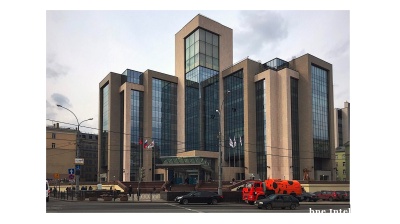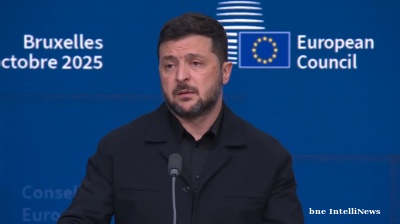New Year is more than just a festive break, a time to catch some breath, than a time that puts a definitive end to some events and sees a start to new ones. In Ukraine the end of December and beginning of January is always a silent period, when most of events and problems slow down. But those problems don’t go away.
In the last few days Ukrainians were alarmed by the announced nationalisation of the country’s biggest commercial bank PrivatBank. Owned by Ukraine’s uber-oligarch Ihor Kolomoisky, PrivatBank is the only privately owned bank with “systemic importance” to the banking system and as such its health has become a condition for Ukraine to secure more financial assistance from the International Monetary Fund (IMF).
Systemic importance means PrivatBank was “too big to fail”. Its collapse would mean the collapse of the financial system as its problems would affect its myriad depositors, especially among small and medium businessmen. Yet its nationalisation will also be of a considerable burden for Ukraine’s economy. Prime Minister Volodymyr Groysman understands the problem very well, as he is the man responsible to find the money needed to keep the bank afloat.
PrivatBank’s nationalisation is bad news for the Ukrainian government, which is putting the finishing touches on the 2017 state budget. The task of finding an additional UAH65bn-UAH80bn ($2.5bn-$3bn) to finance next year’s spending, according to the estimates of the National bank of Ukraine (NBU), and securing parliament’s buy-in for the last minute changes, will not be easy.
Nevertheless, it seems like Groysman doesn’t have a choice: PrivatBank truly is too big to fail, and internal stability is too dependent on the state’s ability to solve this issue without threatening people’s access to their savings right before New Year’s Eve – traditionally the bigger holiday in eastern Europe than Christmas.
Savchenko’s shocking U-turn
One of the most significant recent developments that will be a great challenge for Ukraine is literally happening right now. Nadiya Savchenko, a famous Ukrainian helicopter pilot who was captured and imprisoned by Russia and for a time became an icon of Ukrainian national pride, has taken an unprecedented step; I’m not even afraid to say, a shocking step. Savchenko, who was captured by Russia-backed separatists and illegally taken to Russia where she was sentenced by a Russian court, symbolised Ukrainian strength and courage. Now this symbol has been secretly meeting with separatist leaders, discussing the release of prisoners, granting an amnesty and the possible lifting of Ukrainian sanctions against the self-proclaimed and Russia-backed republics in the east of the country.
In a scandalous interview she gave a few days ago, Savchenko said she doesn’t think Alexander Zakharchenko and Igor Plotnitsky, leaders of self-proclaimed Donetsk and Luhansk people’s republics, the DNR and LNR, are terrorists. She went even further, comparing mercenaries of these regions to Maidan activists, saying that they are fighting against Poroshenko just as Maidan did against Yanukovych. Those statements sound really mad, yet they will have very serious implications for Ukraine.
First of all, with her statements Savchenko is legitimising Donbas mercenaries as rightful representatives of the region. By doing this she is undermining the official position of Ukrainian authorities that treat Zakharchenko and Plotnitsky as Russian proxies and insist all negotiations should be conducted with the Kremlin directly. Moreover, she totally misses the international dimension of the war and Russia’s direct military, financial and political involvement, by talking about the Donbas conflict as if it was a civil war.
That is pretty different from what we’ve heard from her before, right? Whatever the reasons for Savchenko’s change of direction, the turmoil she caused definitely means we will see attempts to review status quo of the Minsk agreement and challenge Kyiv’s position in the negotiations. The Kremlin will definitely use its information resources to spread Savchenko’s message and increase pressure on Kyiv to talk directly to leaders of the Donbas separatists.
Savchenko’s latest actions will have implications not only in the political sphere. Ukrainians feel deeply disappointed, even betrayed, by someone who they believed to be honest and trustworthy. Ukrainians have very few moral leaders they can admire and it just lost someone they believed to be one of them.
Tymoshenko rising
Ukrainians even registered a petition on the president’s website to deprive Savchenko of her Hero of Ukraine title. It’s hard to imagine that could happen in the nearest future, nevertheless Savchenko has already lost one of her titles. She left former prime minister Yulia Tymoshenko’s Batkivshchyna (Fatherland) party and was excluded from the respective parliamentary faction. Batkivshchyna has cut off all connections with Nadya in a quick move to minimise the damage to the party’s ratings. Tymoshenko doesn’t need an unpredictable and uncontrollable party member on the eve of a decisive battle to win power. No doubt next year will be a year of great activity for Tymoshenko. She enters 2017 with the highest approval rating amongst the country’s leading politicians and is determined to push for early parliamentary elections.
Facebook hero
Tymoshenko is not the only one who is looking for early parliamentary elections. Former Georgian president Mikheil Saakashvili has resigned from his post as governor of Odesa, where he garnered a large number of Facebook subscribers but a considerably lower number of real achievements. In fact, his recent rally in Kyiv has sadly proven his slogans are no different from those of Tymoshenko or the leader of Radical party Oleh Lyashko. Saakashvili is a good speaker, but his speeches are full of emotionally charged populist slogans. He is still a big player with loyal supporters, but seems to have lost his momentum. If Saakashvili would have formed his political force a year ago in a coalition with young post-Maidan parties, he could now have been on top of the game. Now he will only get a small piece of the pie in an election, if it comes to dividing pies again.
Still some healthy options
2017 seems to be almost certainly a year of political instability with the ever-present phantom of early elections in the background. But there is one woman who can give some hope to people in these times of disappointment. Ulyana Suprun and her team at the Ukrainian Ministry of Health is someone whose solid performance will have a considerable influence on position of Ukrainian authorities.
A professional with war volunteer and Western experience she seems to be the only real hope for a big reform to take place in 2017. Suprun knows what to do with the Ukrainian health sector and has a sincere desire to do good. Yet she desperately needs some strong political support. That Poroshenko and Groysman are failing to provide any will send a strong signal to Ukrainian society that there is little hope of change from the present team in power.
So far both the presidential administration and government seem to support health ministry initiatives, but they have still have considerable political leverage over Suprun: she is only the interim minister, appointed by prime ministerial decree, not by a vote in parliament. This means that she can be easily fired if the priorities in the government change. That puts considerable pressure on Suprun and her team, but to some extent it also shows that if a reform fails then the political burden will be shared between the ministry and the entire government.
Ukraine will also have to adjust to a changing international environment. In 2017 we will see whether our fears over Donald Trump’s victory in the US presidential elections were justified and the try to adapt to the new rules of the game.
Not only transatlantic relations are at stake, Europe will also see many changes with an upcoming elections in some key countries. There is still no clear solution to finalising the Association Agreement ratification after a Dutch referendum voted against ratification. There has also been an another postponement of the mooted visa liberalisation regime with the EU. These are only two of the challenges Ukraine will have to face in the new year.
Yet the bigger question remains the country’s ability to maintain the support of the international community and prevent Russia from escaping the sanctions it so absolutely deserves for all its wrongdoings. International financial support for Ukrainian reforms is of paramount importance. Ukrainians look at Aleppo as a frightening possible outcome in the Donbas. At the end of the day, if we are not strong enough politically and military then no one will will help us. To translate this understanding into action plan is the biggest challenge of 2017.
Activist, journalist and co-founder of Global Ukrainians, an international network of Ukrainians worldwide, Kateryna Kruk was awarded the Atlantic Council Freedom Award for her work communicating the Euromaidan revolution to the world. She predicted a frozen conflict in July 2014, which has largely come to pass, and now comments on the progress of crucial reforms in Ukraine.
Opinion

Armenia’s painful reorientation toward the West
Yerevan’s drive to break free from its dependency on Moscow is generating profound internal political turbulence and exposing it to new external risks, says a report by the Central Asia‑Caucasus Institute & Silk Road Studies Program.

COMMENT: Europe’s “fake it till you make it” war approach cannot hold off Russia’s trillion dollar war machine
In their speeches on the war in Ukraine, European leaders appear like a video clip looped on repeat. Standing before the cameras they declare new packages of support for Kyiv and threaten new measures to pressure Russia as if it was still 2022.

A year after the Novi Sad disaster, Belgrade faces one crisis after another
Serbia’s government is grappling with a convergence of crises which threaten to erode President Aleksandar Vucic’s once-dominant position.

Don’t be fooled, Northern Cyprus’ new president is no opponent of Erdogan, says academic
Turkey’s powers-that-be said to have anticipated that Tufan Erhurman will pose no major threat.



